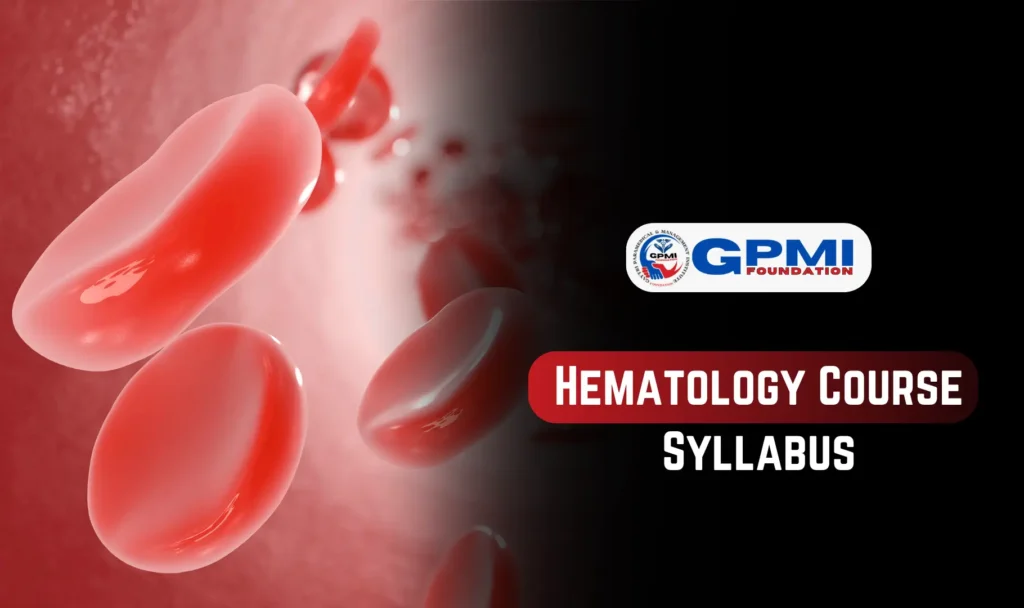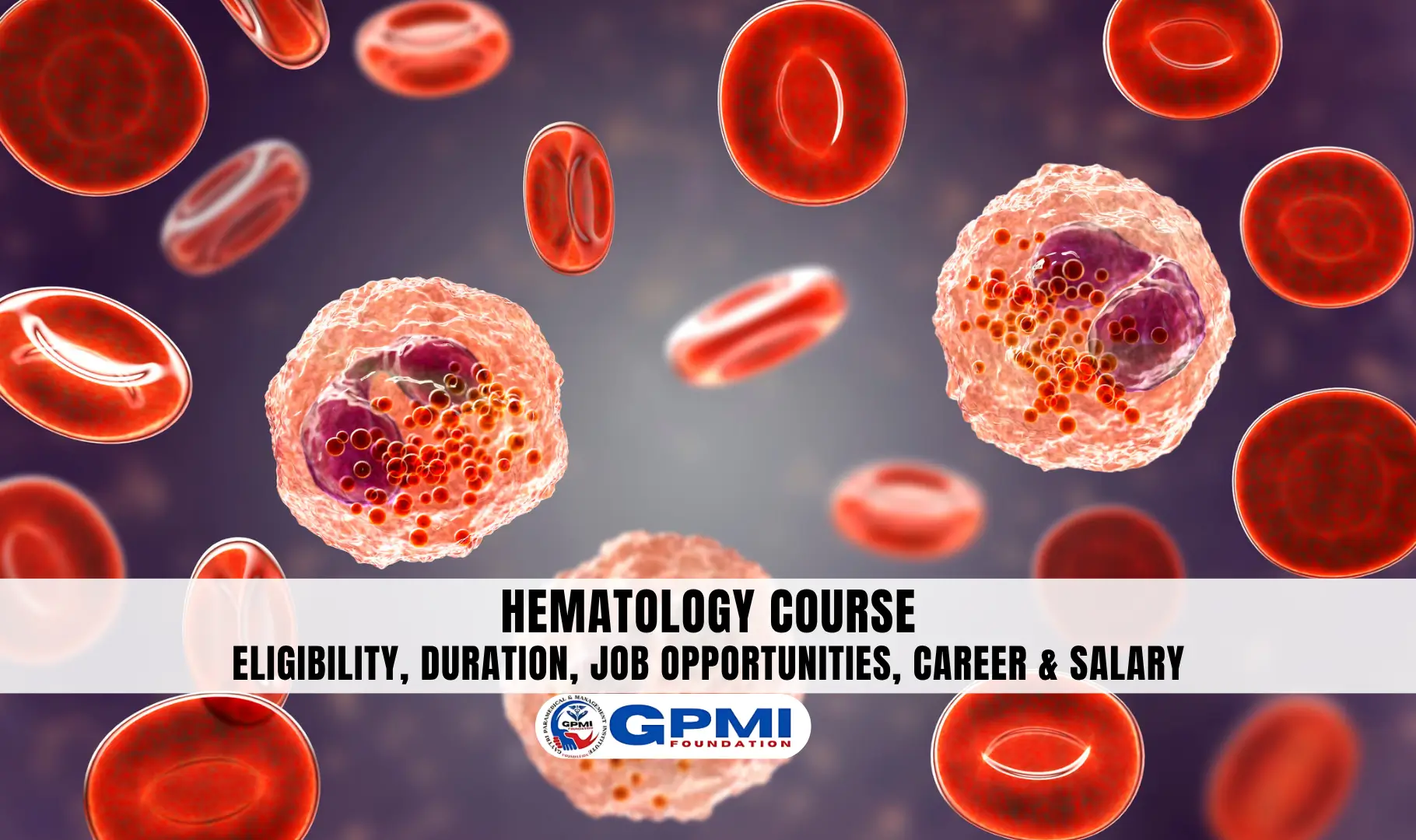Are you interested in learning about blood, diseases, and how doctors find out what’s happening inside our body through blood tests? If yes, then a Hematology Course could be the right choice for you.
Hematology is the branch of medical science that deals with the study of blood, blood cells, and related disorders. It helps doctors diagnose and treat diseases such as anemia, leukemia, and blood infections. In today’s world, where healthcare is growing fast, the demand for trained hematology professionals is increasing every year.
Students who take up a Hematology Course learn how to test, analyze, and understand blood samples using advanced lab equipment. These tests play a vital role in patient diagnosis and treatment — making this field both meaningful and rewarding.
In this article, we will explore 7 powerful reasons to choose a Hematology Course in 2026 and why it is becoming one of the most preferred paramedical careers among students. Whether you are a 10th or 12th pass student looking for a medical-related career or someone passionate about healthcare, this course can open the door to a bright and stable future.
Let’s understand what makes the Hematology Course so special and how it can help you build a successful career in the healthcare industry.
Table of Contents
Hematology Course Details
A Hematology Course is designed to provide students with a deep understanding of blood, blood-forming organs, and various blood-related diseases. Unlike regular classroom studies, this course combines theoretical knowledge with extensive practical laboratory training, ensuring that students gain real-world skills alongside scientific understanding.
During the program, students learn essential tasks such as collecting and testing blood samples, identifying common and complex blood disorders like anemia, leukemia, and clotting disorders, and operating advanced diagnostic laboratory equipment with accuracy. They are also trained to maintain strict lab safety protocols and hygiene standards, which is critical in medical laboratories to prevent contamination and ensure reliable results.
Another key skill students acquire is the ability to analyze and interpret test results accurately, allowing doctors to make informed decisions about patient care. By the end of the course, students are fully prepared to work as Hematology Technicians or Medical Laboratory Technologists, collaborating closely with doctors, pathologists, and other healthcare professionals to contribute effectively to patient diagnosis and treatment.
Eligibility for Hematology Course
To join a Hematology Course, students must meet certain eligibility criteria, which vary depending on the type and level of the program. For certificate and diploma courses, students should have completed their 10th or 12th standard from a recognized education board.
While students from any stream can apply, those with a Science background, especially Biology, Chemistry, and Physics, are preferred because these subjects provide a basic understanding of human anatomy, physiology, and medical concepts, which are essential for learning hematology effectively. These short-term courses are perfect for students who want to gain specialized skills quickly and start working in hospitals or diagnostic laboratories without pursuing a long degree program.
For degree programs, such as a B.Sc. in Medical Laboratory Technology with a Hematology specialization, students must have completed 12th standard with Science subjects. Some colleges or universities may also require a minimum percentage in the qualifying exams to ensure that students have a solid academic foundation.
Additionally, many institutes conduct interviews, aptitude tests, or entrance exams to check a candidate’s interest, understanding, and practical aptitude in the medical and laboratory field. These steps ensure that the students admitted are genuinely motivated, which helps them perform better during the course and in their future careers.
By meeting these eligibility requirements, students can confidently pursue a hematology course, gaining the knowledge and skills needed to become competent hematology technicians or medical laboratory professionals, ready to contribute to the healthcare industry and help improve patient care.
Duration of Hematology Course
The duration of a Hematology Course depends on the type and level of program you choose, giving students flexible options to suit their career goals. Certificate courses are usually short-term programs, lasting from 6 months to 1 year, and are designed for students who want to quickly acquire basic knowledge and practical skills in blood analysis and laboratory techniques. These courses focus on core hematology concepts and hands-on training, allowing students to enter the workforce in a shorter time.
Diploma courses typically last 1 to 2 years and offer a more in-depth understanding of blood science, laboratory management, and clinical diagnostics. Students not only study theory but also spend significant time in laboratories and hospitals, gaining real-world experience. This helps them develop confidence in handling equipment, performing various blood tests, and interpreting results accurately.
For those aiming for a B.Sc. degree in Medical Laboratory Technology with Hematology specialization, the program usually spans 3 years. Degree courses provide comprehensive training, covering advanced topics such as immunohematology, clinical pathology, and research methodologies. Students also receive extensive practical exposure in hospitals and diagnostic labs, which prepares them for higher-level roles and research opportunities in the healthcare sector.
Overall, regardless of the duration, every hematology program is structured to combine theory, practical learning, and real-world experience, ensuring students are well-prepared for professional roles in laboratories, hospitals, and research centers.
Hematology Course Syllabus

The Hematology Course syllabus is carefully designed to provide students with a comprehensive understanding of blood science, medical laboratory technology, and diagnostic procedures. It combines theoretical knowledge with practical training, so students not only learn the concepts but also gain hands-on experience in real laboratory settings.
Most institutes include the following core subjects in their hematology programs:
- Basics of Hematology: Students learn about the composition and functions of blood, types of blood cells, and how blood helps in maintaining overall health.
- Human Anatomy and Physiology: A clear understanding of the human body is essential for accurate blood analysis and interpretation of results.
- Blood Collection and Sampling: Techniques for safely collecting blood samples from patients, maintaining hygiene, and preventing contamination are taught in detail.
- Clinical Pathology: Students study various blood tests, their significance, and how they are used to diagnose different medical conditions.
- Immunohematology: This focuses on blood group testing, transfusion compatibility, and understanding immune-related blood disorders.
- Blood Disorders and Treatment: Students learn about common and rare blood diseases, their symptoms, and the diagnostic tests used for detection.
- Medical Microbiology: Knowledge of microorganisms helps in identifying infections that can affect blood health.
- Laboratory Management: Covers organization, record-keeping, and workflow management to ensure efficient functioning of a medical laboratory.
- Biochemistry and Instrumentation: Teaches students how to use modern lab instruments and analyze chemical components in blood.
- Quality Control in Labs: Ensures that students understand accuracy, precision, and reliability in diagnostic testing.
Practical training is a key part of the syllabus. Students perform various tests like CBC (Complete Blood Count), ESR (Erythrocyte Sedimentation Rate), Blood Typing, and Coagulation Studies, gaining confidence in performing laboratory procedures accurately. This hands-on approach ensures that graduates are well-prepared to work in hospitals, diagnostic centers, and research laboratories immediately after completing the course.
Hematology Course Fees
The fees for a Hematology Course vary depending on the type of program, the duration, and the institute you choose to study at. Certificate courses are generally more affordable, as they are short-term programs designed to give students essential knowledge and practical skills in a limited timeframe. On average, certificate courses may cost between ₹10,000 and ₹30,000, making them an ideal option for students who want to gain specialized skills quickly and start working in medical laboratories or hospitals without investing in a long-term degree program.
Diploma courses offer a more detailed curriculum with extensive practical training and hospital exposure. These courses typically last from 1 to 2 years, and the fees can range from ₹30,000 to ₹80,000, depending on the facilities provided by the institute, the quality of lab equipment, and the expertise of the faculty. Diploma courses are suitable for students looking for both theoretical knowledge and hands-on experience to prepare for a professional career in hematology.
For students aiming for a B.Sc. degree in Medical Laboratory Technology with Hematology specialization, the fees are generally higher due to the longer duration, comprehensive syllabus, and advanced laboratory training. Degree courses may cost between ₹70,000 and ₹1,50,000 per year, but they provide strong career prospects, including opportunities in research, teaching, and higher-level laboratory positions.
Institutes like Gaytri Paramedical & Management Institute (GPMI) offer quality education at affordable fees. Students benefit not only from classroom learning but also from modern labs, practical training, and placement support, which makes the investment in education highly valuable. Choosing the right institute ensures that students receive the knowledge, skills, and experience needed to build a successful career in hematology without spending unnecessarily high amounts.
Salary After Hematology Course

One of the most important considerations for students choosing a career in hematology is the salary potential after completing the course. The field of hematology offers competitive and growing pay because trained professionals are always in demand in hospitals, diagnostic laboratories, blood banks, and research centers.
For fresh graduates or beginners, the starting salary usually ranges from ₹2.5 lakh to ₹4 lakh per year. This may vary depending on the city, type of hospital or laboratory, and the skills of the individual. As students gain practical experience and specialize in certain areas of hematology, they can move into higher-paying roles such as Senior Laboratory Technologist, Hematology Supervisor, or Clinical Research Assistant. Experienced professionals in reputed private hospitals or research institutions can earn ₹5 lakh to ₹10 lakh per year or even more, making hematology a financially rewarding career.
Job roles after a hematology course are diverse. Graduates can work as Hematology Technicians, Medical Laboratory Technologists, Blood Bank Technicians, Pathology Assistants, or Clinical Research Assistants. Some may even pursue higher studies or certification courses to move into research, teaching, or specialized diagnostic fields, which often come with additional financial benefits.
Overall, a career in hematology provides not just job stability, but also a steady increase in income over time, especially for those who continue learning, gain experience, and take advantage of opportunities in hospitals, laboratories, and research centers. For students who are passionate about healthcare and blood science, this career offers both personal satisfaction and financial growth.
Future Scope of Hematology Course
The future of hematology is very promising, as the demand for skilled professionals continues to grow with the expansion of the healthcare sector. Hospitals, diagnostic laboratories, blood banks, research centers, and pharmaceutical companies all require trained hematology technicians and specialists to perform accurate blood tests and support patient care.
Students who complete a hematology course also have the option to pursue higher studies, such as an M.Sc. in Hematology or specialized training in advanced laboratory techniques, which can lead to careers in research, teaching, or hospital management.
With modern healthcare technologies, AI-based diagnostics, and the rising need for blood testing and research, career opportunities in hematology are expanding every year, making it a stable, rewarding, and future-proof career choice for aspiring medical professionals.
7 Powerful Reasons to Choose a Hematology Career in 2026

Choosing a career is one of the most important decisions in life, and a Hematology Course offers multiple advantages that make it a smart choice for students in 2026. Here are seven powerful reasons why this career path is worth considering:
1. High Demand in the Healthcare Industry
The need for skilled hematology professionals is increasing rapidly. Hospitals, diagnostic labs, and blood banks require trained technicians to perform accurate blood tests and assist doctors in diagnosing diseases. This high demand ensures strong job security and a stable career for students entering the field.
2. Job-Oriented and Skill-Based Learning
Hematology courses focus on practical skills that prepare students for real-world laboratory work. From blood sample collection to advanced diagnostic testing, students gain hands-on experience that makes them job-ready immediately after completing the course.
3. Opportunity to Help Save Lives
Hematology professionals play a critical role in patient care. Accurate blood tests help doctors identify conditions like anemia, leukemia, and infections early, allowing timely treatment. This direct impact on patient health makes the career highly rewarding and meaningful.
4. Excellent Career Growth and Salary
With experience and specialization, students can advance from entry-level roles to senior positions like Lab Supervisor, Clinical Research Assistant, or Hematology Manager. The salary increases significantly over time, making it a financially rewarding profession.
5. Affordable Education with High Return
Compared to other medical courses, hematology is relatively affordable, yet it offers excellent career prospects. Students can invest in their education and quickly recover costs through decent starting salaries and opportunities for growth.
6. Opportunities in Research and Innovation
Hematology is not just about testing blood; it also offers opportunities in research, diagnostics innovation, and medical studies. Students can contribute to discovering new treatments, improving lab techniques, and working on advanced medical technologies.
7. Industry-Oriented Training at GPMI
Institutes like Gaytri Paramedical & Management Institute (GPMI) provide practical, hands-on training, modern laboratories, and real hospital exposure. Students also receive placement support, making it easier to start a successful career immediately after the course.
Frequently Asked Questions (FAQ) about Hematology Course
1. What is a Hematology Course?
A Hematology Course is a paramedical program that teaches students about blood, blood disorders, and related diagnostic procedures. Students learn how to collect and test blood samples, operate laboratory equipment, and assist doctors in diagnosing and treating blood-related diseases.
2. Who is eligible for a Hematology Course?
Eligibility depends on the course level:
- Certificate or Diploma: Completion of 10th or 12th standard (Science preferred).
- Degree (B.Sc. in Medical Laboratory Technology with Hematology specialization): 12th with Physics, Chemistry, and Biology. Some institutes may also conduct interviews or entrance exams.
3. What is the duration of a Hematology Course?
- Certificate Course: 6 months to 1 year
- Diploma Course: 1 to 2 years
- B.Sc. Degree: 3 years
The duration varies depending on the depth of study and practical training included.
4. What subjects are included in the Hematology syllabus?
The syllabus usually covers:
- Basics of Hematology
- Human Anatomy and Physiology
- Blood Collection and Sampling
- Clinical Pathology
- Immunohematology
- Blood Disorders and Treatments
- Medical Microbiology
- Laboratory Management and Instrumentation
- Quality Control in Labs
Students also gain practical experience performing tests like CBC, ESR, and Blood Typing.
5. How much does a Hematology Course cost?
Fees depend on the type of course and institute:
- Certificate: ₹10,000 – ₹30,000
- Diploma: ₹30,000 – ₹80,000
- Degree: ₹70,000 – ₹1,50,000 per year
Institutes like GPMI provide affordable fees, practical training, and placement support.
6. What is the salary after completing a Hematology Course?
- Starting Salary: ₹2.5 – ₹4 lakh per year for freshers
- Experienced Professionals: ₹5 – ₹10 lakh per year or more
Career roles include Hematology Technician, Medical Lab Technologist, Blood Bank Technician, Pathology Assistant, and Clinical Research Assistant.
7. What are the future career opportunities in Hematology?
Graduates can work in:
- Hospitals and diagnostic labs
- Blood banks
- Research centers and pharmaceutical companies
- Teaching and higher education
With advanced training and experience, students can pursue research, lab management, or specialized clinical roles.
8. Why should I choose GPMI for a Hematology Course?
GPMI provides industry-oriented training, experienced faculty, modern laboratories, hospital exposure, and placement support. Students gain practical skills and confidence to start their careers immediately after the course, making it one of the best institutes for hematology education in India.
Conclusion
The Hematology Course is one of the most promising and rewarding paramedical courses for students who are looking to build a stable, respected, and fulfilling career in the healthcare industry. It combines theoretical knowledge with practical, hands-on training, giving students the confidence and skills needed to work efficiently in hospitals, diagnostic laboratories, blood banks, and research centers.
By learning how to accurately analyze and interpret blood samples, students play a direct role in patient diagnosis and treatment, which adds a meaningful dimension to their work.
For students who are passionate about medical science, enjoy working in laboratories, and want to contribute to improving people’s health, hematology offers both personal satisfaction and professional growth. With the increasing demand for skilled professionals in this field, now is the perfect time to pursue a hematology course, gain expertise, and secure a bright and successful future.







